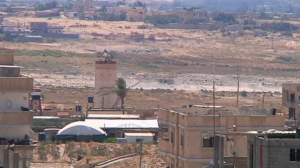
JULY 3 (Reuters) — Egypt launched air strikes on Islamist militant targets in the Sinai Peninsula on Thursday (July 2), killing 23 fighters a day after the deadliest clashes in the region in years, security sources said.
The sources said those killed had taken part in Wednesday’s (July 1) fighting in which 100 militants and 17 soldiers, including four officers, were killed, according to the army spokesman.
Sinai-based insurgents, affiliates of Islamic State, have stepped up attacks on soldiers and police since then-army chief Abdel Fattah al-Sisi toppled Islamist President Mohamed Mursi in 2013 after mass protests against his rule.
The clashes were a failure in Egyptian intelligence, a journalist specializing in Sinai affairs said.
“Yesterday’s attack is a clear sign that we have a severe shortage of intelligence and it’s possibly a temporary – hopefully a temporary – failure in the intelligence,” Mohannad Sabry said.
Sisi, now Egypt’s elected president, says the pro-Islamic State group Sinai Province, and other militant factions, pose an existential threat to Egypt, other Arab states and the West.
Sabry said the attacks showed a high level of sophistication.
“What happened yesterday was a vivid display of how these groups plan ahead of the time, recruits and builds up its military power, and attacks at times best for them, at times where their attacks would be more effective. And they apparently have some masterminds who are very knowledgeable about the ground they’re fighting on, and also about the tactics they use in guerilla wars. What happened yesterday was a sophisticated, an extremely sophisticated, plan of attack, and plan of capturing territory,” he said.
This week has been especially troubling for Egypt, a strategic U.S. ally which has a peace treaty with Israel and controls the Suez Canal, a vital global shipping lane.
The militants’ assault, a significant escalation in violence in the peninsula between Israel, the Gaza Strip and the Suez Canal, was the second major attack in Egypt this week.
This is something that should draw interest from across the world, according to Sabry.
“As one of my friends there who were under fire described it — they took a city of 60,000 people hostage throughout the battle, and this is exactly what happened and this is an unprecedented development. It’s a development that, not only Egypt, but the whole world should look at,” Sabry said.
On Monday, a car bomb killed the prosecutor-general in Cairo, the highest-profile official to die since the insurgency began.







